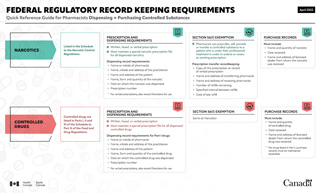Federal regulatory record keeping requirements: Quick reference guide for pharmacists dispensing and purchasing controlled substances

Download the alternative format
(PDF format, 452 Kb, 2 pages)
- Organization: Health Canada
- Date published: April 2022
April 2022
Quick reference guide for pharmacists dispensing and purchasing controlled substances
Narcotics
Listed in the Schedule to the Narcotic Control Regulations.
Prescription and dispensing requirements
- Written, faxed or verbal prescription
- Must maintain a special narcotic prescription file for all dispensed narcotics
Dispensing record requirements:
- Name or initials of pharmacist
- Name, initials and address of the practitioner
- Name and address of the patient
- Name, form and quantity of the narcotic
- Date on which the narcotic was dispensed
- Prescription number
- For verbal prescriptions, also record directions for use
Section 56(1) exemption
- Pharmacists can prescribe, sell, provide or transfer a controlled substance to a patient who is under their professional treatment in order to extend or renew an existing prescription
Prescription transfer recordkeeping:
- Copy of the prescription or record of verbal prescription
- Name and address of transferring pharmacist
- Name and address of receiving pharmacist
- Number of refills remaining
- Specified interval between refills
- Date of last refill
Purchase records
Must include:
- Name and quantity of narcotic
- Date received
- Name and address of licensed dealer from who the narcotic was received
Controlled drugs
Controlled drugs are listed in parts I, II and III of the Schedule to Part G of the Food and Drug Regulations
Prescription and dispensing requirements
- Written, faxed or verbal prescription
- Must maintain a special prescription file for all dispensed controlled drugs
Dispensing record requirements for Part I drugs:
- Name or initials of pharmacist
- Name, initials and address of the practitioner
- Name and address of the patient
- Name, form and quantity of the controlled drug
- Date on which the controlled drug was dispensed
- Prescription number
- For verbal prescriptions, also record directions for use
Section 56(1) exemption
- Same as Narcotics
Purchase records
Must include:
- Name and quantity of controlled drug
- Date received
- Name and address of licensed dealer from whom the controlled drug was received
Note, for drugs listed in Part I, purchase records must be maintained separately.
Low-dose codeine preparations
Codeine is listed in the Schedule to the Narcotic Control Regulations. Low-does codeine preparations contain codeine up to 8 mg/solid dosage form or 20 mg/ 30 mL of liquid, and 2 or 3 active non-narcotic ingredients.
Prescription and dispensing requirements
- Pharmacist can dispense without a prescription
- If a prescription is available, same as Narcotics
- The following must appear on the label:
- This preparation contains codeine and should not be administered to children except on the advice of a physician, dentist or nurse practitioner.
Section 56(1) exemption
- Not applicable when there is no prescription
- If a prescription is available, same as Narcotics
Purchase records
- Same as Narcotics
Benzodiazepines and other targeted substances
Listed in the Schedule to the Benzodiazepines and Other Targeted Substances Regulations
Prescription and dispensing requirements
- Written, faxed, or verbal prescription
Labelling required on container:
- Name and address of pharmacy or pharmacist
- Date of issuance of prescription
- Prescription number
- Name of patient
- Name of practitioner
- Name of targeted substance
- Quantity
- Strength per unit of targeted substance
- Directions for use specified by the practitioner
Dispensing record requirements:
- Date prescription was filled or refilled
- Quantity of targeted substances provided
- Pharmacist's name or initials
- Prescription number
Written record of verbal prescription:
- Name and address of patient
- Date verbal prescription was provided
- Name of the targeted substance
- Quantity
- Strength per unit of the targeted substance
- Name of the recording pharmacist
- Name of the practitioner who issued the prescription
- Directions for use specified by the practitioner
- If applicable, the number of times it may be refilled and the interval between refills
Section 56(1) exemption
- Same as Narcotics
Purchase records
Must include:
- Name of targeted substances
- Quantity and strength per unit of the targeted substance
- Number of units per package
- Name and address of supplier
- Date received
Additional information
Any loss or theft of a narcotic, controlled drug, or targeted substance, including dispensed forgeries, must be reported to Health Canada within 10 days of discovery.
All records must be kept in the pharmacy for a period of two years from the date that each record is made.
This quick reference guide is not exhaustive. For further details, please refer directly to the applicable federal regulations. In the case of any discrepancy between this document and the actual text of the prevailing legislation, the legislative text will prevail.